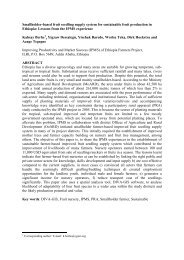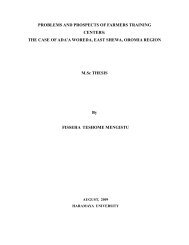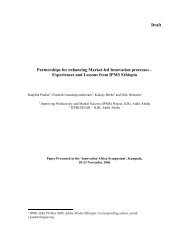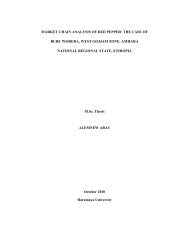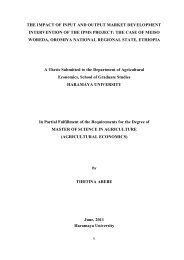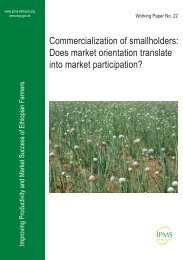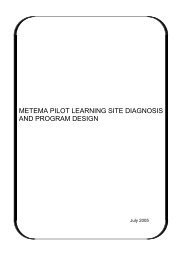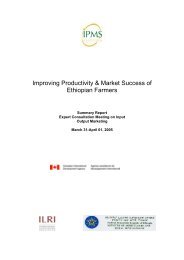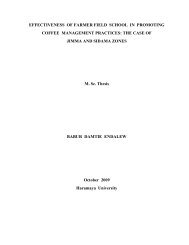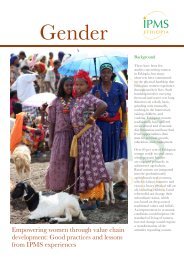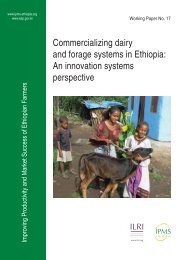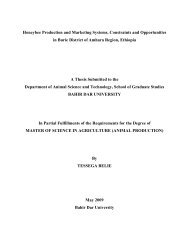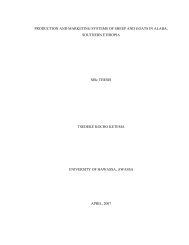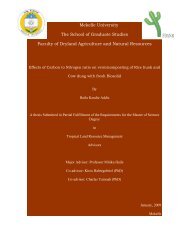effectiveness of modular training at farmers - IPMS Information ...
effectiveness of modular training at farmers - IPMS Information ...
effectiveness of modular training at farmers - IPMS Information ...
You also want an ePaper? Increase the reach of your titles
YUMPU automatically turns print PDFs into web optimized ePapers that Google loves.
4.2.2. PracticePractice was oper<strong>at</strong>ionalzed as the applic<strong>at</strong>ion <strong>of</strong> knowledge acquired from the <strong>training</strong>. It isthe transfer <strong>of</strong> learning. Practices <strong>of</strong> <strong>farmers</strong> were evalu<strong>at</strong>ed based on their responses on theapplic<strong>at</strong>ion <strong>of</strong> recommended technologies <strong>of</strong> bee keeping, dairy and f<strong>at</strong>tening. In order toknow practices used by trained <strong>farmers</strong>, an assessment was administered with questionshaving seven scores on trained and untrained <strong>farmers</strong> for apiculture, dairy and f<strong>at</strong>tening. Themeans <strong>of</strong> practices <strong>of</strong> trained and untrained <strong>farmers</strong> were analyzed using independent samplet-test and results are presented below in Table 9.Table 9: Practice difference <strong>of</strong> sample householdsRespondents N Mean SD t- value p-valueTrained 60 4.45 1.53 1.981** 0.05Untrained 60 3.82 1.94Source: Own survey d<strong>at</strong>a (2010)** Significant <strong>at</strong> 5% probability levelThe practice comparison <strong>of</strong> trained and untrained <strong>farmers</strong> showed th<strong>at</strong> the mean scores <strong>of</strong>practices <strong>of</strong> trained respondents were significantly higher than th<strong>at</strong> <strong>of</strong> untrained respondents.This may be due to the fact th<strong>at</strong> trained <strong>farmers</strong> might have <strong>at</strong>tended farming practices <strong>of</strong>beekeeping, dairy and f<strong>at</strong>tening with ‘learning by doing’ programs and the <strong>training</strong> <strong>of</strong>fered byFTCs has improved the level <strong>of</strong> applic<strong>at</strong>ion <strong>of</strong> the scientific recommend<strong>at</strong>ions in thosepractices thereby comparing the traditional and improved management technologies resultingin better practices <strong>of</strong> those commodities as compared to untrained <strong>farmers</strong>.Trained <strong>farmers</strong> had low, medium and high c<strong>at</strong>egories in 13.3%, 60.0%, and 26.7% level <strong>of</strong>practice respectively regarding improved beekeeping, dairy and f<strong>at</strong>tening practices withreference to its management systems. However, almost 38.3%, 36.7% and 25.0% <strong>of</strong> untrained<strong>farmers</strong> were found in low, medium and high level <strong>of</strong> practice c<strong>at</strong>egories <strong>of</strong> the same51



